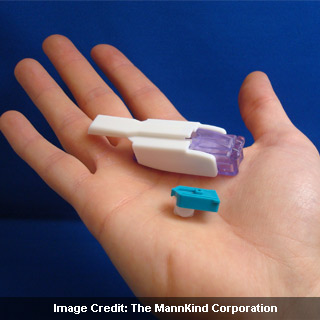
Since the insulin is soaked in so fast, AFREZZA’s sketch could strongly imitate the usual early insulin reaction observed in fit people. The device is said to be waiting for approval by the U. S. Food and Drug Administration (FDA).
Andrea Leone-Bay, Ph.D. and colleagues at MannKind Corporation mentioned that the new insulin creation utilizes the Technosphere technology, a delivery technology that could be relevant to a wide array of other drugs that are presently injected. Similar to insulin, these medications are believed to be proteins that could be digested and destroyed in the stomach if consumed by mouth. One such invention, MKC-180, is claimed to be a Technosphere formulation of a natural hormone that may regulate appetite and is believed to be under research as a therapy for obesity by means of pulmonary delivery.
Leone-Bay, commented, “In nonclinical studies remarkable reductions in food intake have been observed. Our proprietary Technosphere Technology platform is based on particles formed by the self-assembly of a small molecule. Drugs can be loaded onto these particles, which are then dried to form a dry powder. Using a thumb-sized device, patients inhale a small amount of the powder, roughly equivalent to a pinch of salt. This powder dissolves immediately after inhalation and the drug is absorbed into the patient’s bloodstream. Most importantly, the drug is absorbed ultra-rapidly so it becomes effective much more quickly than an injection of the same drug. For some drugs, ultra-rapid systemic delivery provides distinct clinical advantages over injection, including profiles that match the body’s natural responses in processes like hormone secretion.”
AFREZZA Inhalation Powder is alleged to be an ultra-rapid acting insulin planned for use at mealtime to regulate the swift increase in blood sugar levels that could arise in people suffering from diabetes instantly following a meal. During other times, people suffering from diabetes could obtain injections of other types of insulin.
Leone-Bay is of the opinion that AFREZZA may manage glucose in addition to present high-tech treatments. It seems to pose a lesser threat of hypoglycemia than that naturally linked to mealtime insulin therapy and results in less weight gain as opposed to other insulin treatments. Additionally and importantly the device could provide the unique benefit of a small, discreet, and easier-to-use inhalation product.
The findings were presented at the 239th American Chemical Society National Meeting.
